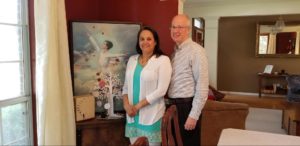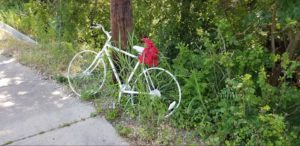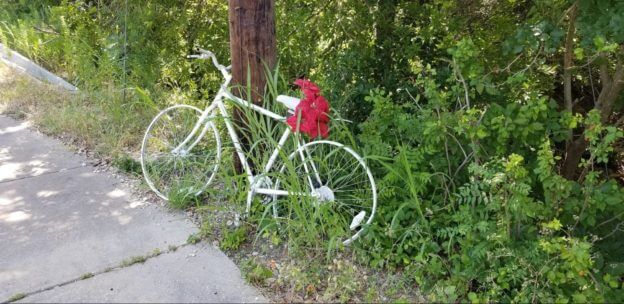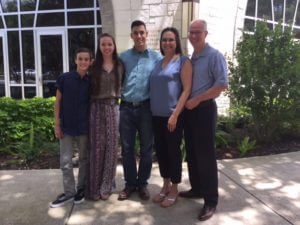
Anna and Eric Bauereis in their home with a painting of their son, Alexei, who was hit and killed by a car while crossing in a crosswalk. Local painter Larry Jolly created the painting by using a photo taken by Ballet Austin.
By SARAH DOOLITTLE, Four Points News
On the first anniversary of her son Alexei’s death, Anna Bauereis posted a message on Facebook asking if anyone would like to come by the house and share their memories of her son. She remembers telling her husband that she was worried she would spend the day sitting alone in her front yard.
Instead, by 6 p.m,, “There were two six foot tables full of food and over 75 people in our front yard,” she recalls.
Now on the second anniversary of her son’s death, Anna and her husband Eric are on a mission to make sure that no one else has to go through what their family went through. The family, along with their older daughter Anastasia, currently lives in North Austin after moving from River Place in 2013.
A distracted driver, an unsafe intersection
On June 7, 2016, 14-year-old Alexei was struck and killed by a driver as he crossed the street in a crosswalk with his friend Alex. (Alex was unharmed.)
The boys had pushed the button for the crossing signal, but because the lights at the intersection had switched to a flashing cycle at 9 p.m., the button did not work. Nor was the street sensor that tells a light when a car is present working at that intersection at the corner of Spicewood Springs and Rustic Rock Drive in Austin.
The driver of the car, a 19-year-old young man, was said to be changing the music on his phone and speeding five to ten miles over the speed limit at the time of the accident.
No one knows to this day if Alexei, who had his bike with him, was walking his bike or riding it. The driver didn’t see either boy, and Alex was walking ahead of Alexei and so had his back turned to his friend. Alex just remembers hearing the impact and turning to see sparks flying as the vehicle made contact with the bike.
Alexei suffered blunt force trauma and died on the scene.
“A boy was hit.”
At their house just three tenths of a mile away on Rustic Rock Drive, Anna remembers, “I just sat straight up in bed. And I was like, Alexei’s not home. Where is he?”
It was 10 p.m. and she had gone to bed earlier, tired from a long work week. It was a summer night and the boys had been hanging out at Alexei’s house.
“We just assumed that they had eaten all of our food, so they had migrated to Alex’s house to eat his mom out of house and home,” said Anna. “It’s what teenage boys do.”
But when Eric tried to call Alexei several times on his cell phone and got no response, they started to worry. “(Eric) went to the end of the street,” said Anna. “And there was an ambulance there.”
Emergency workers would not let Eric approach the intersection, which was completely blocked off by police.
“I just asked what was going on,” recalled Eric. “And they said, ‘A boy was hit.’ And I asked, did he have a bike? And they said, ‘Yes, how did you know?’… But then they just stopped me and said, ‘You cannot come any further.’”
Eric still doesn’t know why they would not let him approach, whether it had to do with procedural rules or not believing he was who he said he was. “They said he was hurt badly, and that’s all they would tell me.”
They told Eric they were taking the boy to St. David’s Round Rock Medical Center, so Eric rushed home to gather up Anna and Anastasia to take everyone to the hospital.
“I was freaked out. I was worried. I was panicked. I didn’t know what to tell (Anna and Anastasia)… I said a little prayer on the short block down the road,” remembered Eric.
As soon as she heard the news that her son was being taken to Round Rock, so far away, Anna’s instincts told her the worst had already happened. “I sat on the stairs for a moment, and I just got heat from head to toe,” she said. “And I was like, Alexei’s dead.”
Once at the hospital, she said, “Nurses were giving us weird looks, and I was like, this is not good.”
The family was placed in a small room to wait for doctors to speak to them about their son.
Anna remembers feeling confused, then almost angry. “These doctors came in, and to me, in hindsight, they seemed to be rambling. I feel like I should go apologize to them, but I just said, ‘Shut up. Are you telling me my kid is dead?’ And they said, ‘Yes.’”
Anna said everything in the room went white and she hit her knees, crying out, “Oh God!”
“I was in shock for the next year.”
In the aftermath of that terrible night, Eric and Anna have learned far more than they had ever planned to know about traffic signals, light sensors and the rights of pedestrians in crosswalks.
The police department did not provide the family with the report from the accident until February. From the report, they learned some upsetting information, such as the fact that Alex, Alexei’s friend, had been made to wait for three hours after the accident to speak to a detective.
“And then of course they’re grilling hm over little details that at that point he couldn’t remember,” said Eric. “He was just so much in shock.”
The question of whether Alexei was walking or riding his bike across the crosswalk was pivotal to police. “If you’re on a bike, you’re not a pedestrian,” but considered a vehicle, said Anna. “So no ticket is written.”
So even though the young man driving the car admitted to speeding and being distracted and failed to yield to pedestrians in a crosswalk, he was not in any way cited.
As Eric said, “The rules say these are all just fines. And that unless you do something really terrible — you’re speeding twice the speed limit or something really terrible — it’s not criminal negligence, it’s not gross negligence. It’s just an accident.”
Traffic lights & the law
For the family, Alexei’s death points to a bigger issue with pedestrian safety in Austin and around the U.S.
The city originally had a four way stop sign at that intersection, but switched to traffic lights as the population in the area grew.
But even though the intersection has a school on one side and a park on the other, the light switched to flashing at 9 p.m., even during the summer months.
“When (a light) goes to a flashing cycle, you can’t walk up to the pole and push the button so that you can walk across the street,” said Eric.
He added that, “To a certain extent, the city in effect admitted that (the light was misprogrammed) by immediately moving it to (a later time).”
“But it took someone dying to make that happen,” said Anna.
Though their son was hit and killed by a car, “If you look at the (report) the way it’s written,” said Anna, “Alexei is at fault because he crossed on a red flashing light.”
The law, though, gives right-of-way to pedestrians crossing within a crosswalk, as were Alex and Alexei, and cars must yield to them.
Eric appeared on NBC Nightly News May 25 to talk about Alexei’s death and learned during that appearance that each year more children, as pedestrians, are killed by cars than in school shootings.
According to the Washington Post, 141 kids and educators have been killed in school shootings in the nearly 20 years since Columbine. But in 2015 alone, according to the National Highway Traffic Safety Administrations, 233 child pedestrians were killed by motor vehicles.
Furthermore, a report from the Insurance Institute for Highway Safety published recently indicated that pedestrian fatalities overall jumped by 54 percent in cities and suburbs from 2009 to 2016. SUVs were involved more than any other type of vehicle and accounted for 81 percent of pedestrian deaths.
The Bauereis’ are now in the process of writing a law to protect pedestrians. They also want to see accountability. “If you spent $2 million, our street sensors would be taken care of and fixed, and you could go up to a pole and push a button” to cross the street safely, Anna added.
It seems a small price to prevent the loss of a life, especially one of a beloved child.
Insurance, hospital
On top of everything else that happened, the family’s health insurance carrier refused to pay the $30,000 hospital bill from St. David’s Round Rock because, while doctors worked on Alexei for 12 minutes, he was already dead when he arrived. The insurance company deemed the hospital’s efforts to be, “medically unnecessary.”
There are actually two separate death certificates issued for Alexei, one from the intersection in Travis County and another from the hospital in Williamson County.
Eric explained that, in the past, “Austin Police got so much heat for leaving a dead body in the street where lots of people could see it, slowing down traffic, making a scene, that they had… an internal policy that said clear the scene.”
So Eric was taken to the hospital even though he had already been declared dead.
Denied the chance to see his son at the scene of the accident, Eric identified his son’s body at the hospital.
Anna, however, declined to do so, not wanting to remember her son thusly. “Even at the funeral home, a pastor went with us, and I let him make that decision whether I should see him or not. And they recommended I not.”
“Nobody should have to go through what we’ve gone through.”
The first anniversary of Alexei’s death came and went with lots of people asking the family what had happened: had the young man who had hit Alexei been arrested? Had he gone to jail?
The family had sued the city of Austin in 2017 for damages from the loss of their son and alleged negligence on the city’s part. They came to realize that the young man who hit Alexei, just 19 at the time of the accident, was underinsured and not worth pursuing in court.
Their anger at the young man, though, was tempered when, just weeks ago, they learned from Alex that after hitting their son with his car, the young man had also used life-saving measures on Alexei.
This new information provided Anna and Eric a measure of comfort. “It would have been nice to know a long time ago that he was sorry, that he did try to help our son,” said Anna. “Just these little things that add up to so much.”
A focus on family & grieving
Alexei and his sister Anastasia were homeschooled and constantly together. He was an avid ballet dancer who danced about 35 hours a week in various studios around Austin and Anastasia a figure skater.
Alexei first started dancing at age five when his mom took Anastasia to sign up for ballet classes. She needed to strengthen her core and dance skills for figure skating. “He saw a picture of Paul Bloodgood (a lead dancer) on a wall in Ballet Austin and he said, that’s what I want to do,” said his mom.
“And I said, ‘No you don’t,’” remembers Anna, laughing.
Anastasia is still actively grieving her brother and frequently dreams of seeing him. “I think it’s harder for younger people to recognize the grief process and start walking through that grief process,” said Anna. Though Anastasia had lifelong goals for her figure skating career, she left the ice in December of 2017 and has not returned since.
Despite having Aspergers, a sensory processing disorder and attention deficit disorder, Alexei thrived, and his Christian faith and friendship with his sister were integral parts of his life.
In part due to their son’s brain disorders, the family bought a Brain Balance in Westlake when the kids were still young. Brain Balance offers therapeutic services to kids with sensory, processing, learning and other developmental disorders and disabilities.
The family was set to open a second branch of Brain Balance in Cedar Park the weekend after Alexei died. Thanks to an outpouring of support from their community, the business was opened with help from other franchise owners.
“The whole community surrounded us,” explained Anna. “We didn’t have money for a funeral. We just didn’t plan that. We had sunk every penny we had into opening another business so we could serve the community more.”
June 18th was Alexei’s funeral, which over 700 people attended. At the funeral, people waited in line for over and hour to share how Alexei had impacted their lives. “That was just so beautiful,” said his mom.
“We’re not at Four Points (anymore). But the people from River Place… that I played tennis with… they came here to our house. Ballet Austin, the entire dance community, came to our house,” said Anna. “So even though we’re not physically in those places, people still have come to us and been with us on this journey. What a beautiful community.”
Moving forward,
Anna and Eric are focused on what matters most: Anastasia, Anna’s three older kids from a previous marriage and six grandkids, their marriage and the grieving process.
Anna is writing a book about finding the joy in grief and while grieving.
And she and Eric are grateful to have had each other throughout. “I think there is some core belief that God put us together,” said Eric. “We’re better off together, we can support each other.”
“Our community has lost a gentleman, a Godly man, somebody who made a difference in this world,” explained Anna. “Our community lost that. He was born here. He was raised here. He danced here. He was proud to be here. He’s gone.”

Alexei Bauereis’s “ghost bike” sits at the intersection or Spicewood Springs and Rustin Rock Drive where he was hit and killed while crossing in a crosswalk. The bikes are installed by anonymous individuals in Austin to memorialize those killed in accidents involving bicycles.



